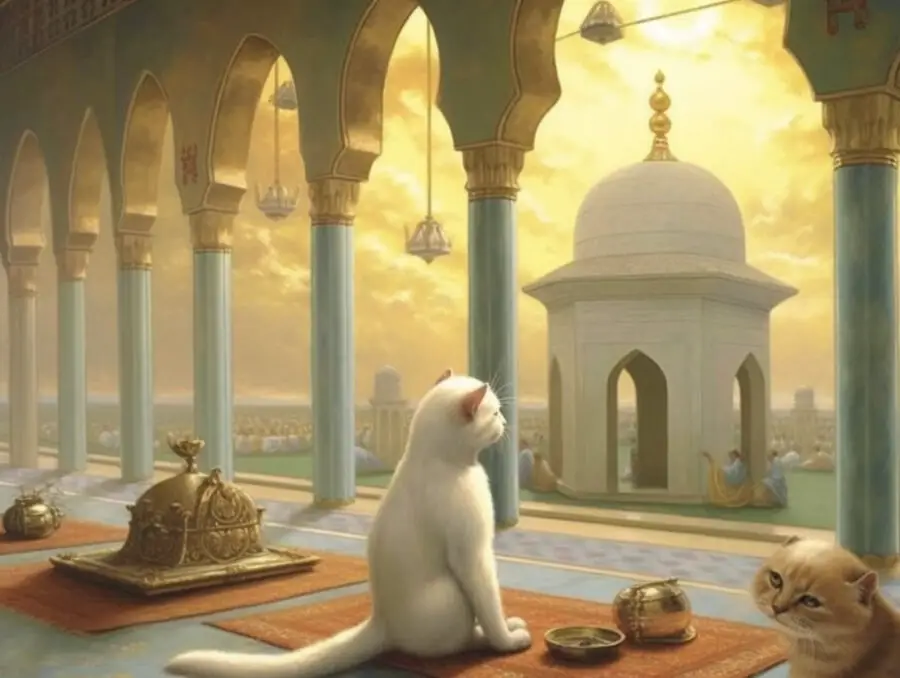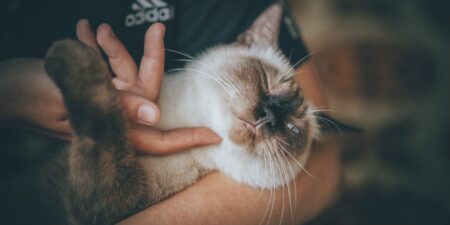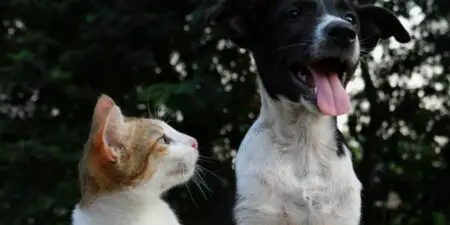Have you ever wondered about the place of cats in Islam and their relationship with the Islamic faith? Islam is renowned for its holistic approach, encompassing not only human interactions but also human-animal relationships.
This quick blog post explores cats in the Quran and Islamic teachings about cats.
Cats in the Quran: An Islamic Perspective
Cats hold a unique place in the Islamic faith.
While the Qur’an, the holy book of Islam, has many mentions of animals, it does not specifically mention cats.
Animals mentioned in the Qur’an include camels, cows, birds, and insects, among others.
They are typically used as symbols or examples in parables.
However, in the Hadiths, which are the sayings and actions of the Prophet Muhammad, cats are mentioned.
The Prophet is reported to have had a great fondness for cats and treated them with kindness and respect.
There’s a popular story of the Prophet Muhammad cutting off a piece of his robe rather than disturbing a cat that was sleeping on it.
Exploring the Islamic View on Pets
Islam views animals as God’s creatures to be respected and cared for.
Pets, particularly cats, enjoy a cherished position in Islamic culture.
Their cleanliness is emphasized, and they are welcomed into homes and mosques.
Animals in the Quran: An Overview
Animals in the Quran are often used symbolically or to impart lessons.
However, the direct mention of cats in the Quran is absent.
But, their essence is captured through their portrayal in the Hadiths.
The Prophet Muhammad’s Love for Cats

The Prophet Muhammad’s interactions with cats provide valuable insights into Islam’s view on these creatures.
The Tale of Muezza, Prophet Muhammad’s Cat
One of the most endearing tales is of Muezza, the Prophet Muhammad’s cat.
Anecdotes tell us that the Prophet cut off his robe’s sleeve to avoid waking Muezza sleeping on it.
This story illustrates the kindness and respect Islam implores toward animals.
Teachings from Hadiths about Cats
Several Hadiths highlight the Prophet’s interactions with cats.
In Sunan Abu Dawood, Hadith 551, the Prophet declares a cat’s presence does not make food impure.
Another powerful Hadith, Sahih Bukhari, Volume 3, Book 40, Hadith 553, narrates a woman’s punishment in Hell for imprisoning a cat until it died.
Cats and Islamic Law: Understanding the Connection
Islam outlines specific laws regarding the treatment of animals, including cats.
Islamic Animal Rights and Treatment of Cats
Islamic law (Shariah) mandates kindness towards all living creatures.
Cats, like all animals, have rights in Islam.
Their mistreatment is considered a serious offense.
Cats and Cleanliness in Islam
Cats are considered ritually clean (tahir) in Islam.
They are allowed to enter homes and mosques, and their touch does not require ablution (wudu) to be repeated.
Conclusion
Cats are beautiful companions cherished and respected in Islam.
The Prophet Muhammad’s compassionate conduct toward cats imparts a timeless lesson of kindness and respect toward these wonderful creatures.
You may also be interested in this article — What Is the Biblical Meaning of Cats?
The Cat and the Imam (Video)
Related Questions
Are cats considered clean in Islam? Yes, cats are indeed considered clean, or ‘tahir’, within the Islamic faith. This belief comes from various Hadiths, such as Sunan Abu Dawood, Hadith 551, where it’s stated that a cat’s presence does not impurify food or drink. Therefore, contact with cats does not require the repetition of the ablution (wudu) before prayer.
Can cats enter mosques according to Islamic law? Yes, cats are permitted to enter mosques in Islam. Their status as ‘tahir’ and independence as creatures that can care for their own cleanliness contribute to this acceptance. This is reflective of Islam’s overall respect and consideration for animals.
Did Prophet Muhammad have a pet cat? Yes, according to popular stories and traditions, Prophet Muhammad had a pet cat named Muezza. The Prophet is said to have had a great fondness for Muezza. In one often-cited story, the Prophet cut off the sleeve of his garment rather than disturb Muezza, who was sleeping on his robe.
Is the mistreatment of cats considered a sin in Islam? Yes, the mistreatment of any animals, including cats, is viewed as a sin in Islam. Islamic teachings emphasize mercy, compassion, and respect toward all of God’s creations. A Hadith in Sahih Bukhari tells of a woman punished in the afterlife because she imprisoned a cat without providing it with food or water or letting it fend for itself.
What is the significance of cats in Islamic culture? Cats hold a distinct and respected place in Islamic culture. They are valued for their cleanliness, independence, and graceful behavior. Their respected status is demonstrated by their presence in homes and mosques and by the Prophet Muhammad’s interactions and kindness towards them, as recorded in various Hadiths. These narratives have contributed to the high regard for cats in many Muslim societies.
"In ancient times cats were worshipped as gods; they have not forgotten this."
-- Terry Pratchett





